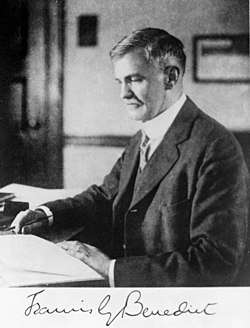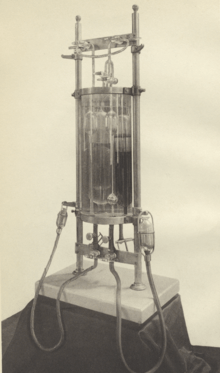Francis Gano Benedict
Francis Gano Benedict (October 3, 1870 – April 14, 1957) was an American chemist, physiologist, and nutritionist who developed a calorimeter and a spirometer used to determine oxygen consumption and measure metabolic rate.[1]


Biography
Born in Milwaukee, Wisconsin, Benedict attended Harvard University, earning his bachelor's degree in 1893 and his master's degree in 1894. He earned his Ph.D., magna cum laude, at Heidelberg University in 1895. He taught at Wesleyan University and did work for the U.S. Department of Agriculture. He was elected a Fellow of the American Academy of Arts and Sciences in 1909.[2]
After retirement in 1937 he toured and lectured about magicians. He died at his home in Machiasport, Maine, aged 86.[3]
Fasting study
Benedict observed Agostino Levanzin, who fasted for thirty-one days at the Carnegie nutrition laboratory.[4][5] George F. Cahill Jr. was influenced by the study and conducted similar studies.[6]
Selected publications
- The Influence of Inanition on Metabolism (1907)
- The Composition of the Atmosphere with Special Reference to its Oxygen Content (1912)
- A Study of Prolonged Fasting (1915)
- Chemical and Physiological Studies of a Man Fasting Thirty-One Days (1915)
- Human Vitality and Efficiency Under Prolonged Restricted Diet (1919)
References
- Maynard, L. A. (1969). "Francis Gano Benedict--a biographical sketch (1870-1957)". The Journal of Nutrition. 98 (1): 1–8. PMID 4891274.
- "Book of Members, 1780–2010: Chapter B" (PDF). American Academy of Arts and Sciences. Retrieved June 2, 2011.
- Associated Press (May 16, 1957). FRANCIS BENEDICT, A CHEMIST, WAS 86; Former Teacher at Wesleyan and Director of Carnegie Nutrition Laboratory Dies. The New York Times
- Benedict, Francis G. (1912). An Experiment on a Fasting Man. Science 35 (909): 865.
- "Levanzin's New Charges: Fasting Professor Says He Was Nearly Killed by Sulphuric Acid". The New York Times.
- Cahill, George F. (2006). FuelMetabolism in Starvation. Annu. Rev. Nutr. 26: 1-22. "In 1965, we enlisted six divinity students to fast for eight days and studied the levels of every metabolic substrate and hormone that we could measure. The central role of insulin in controlling the fed state had been well characterized, and its role in fasting needed clarification. Essentially, we repeated and expanded the 1911 classical study of starvation by Benedict, who fasted a Maltese, Mr. Levanzin, for 30 days and nights."